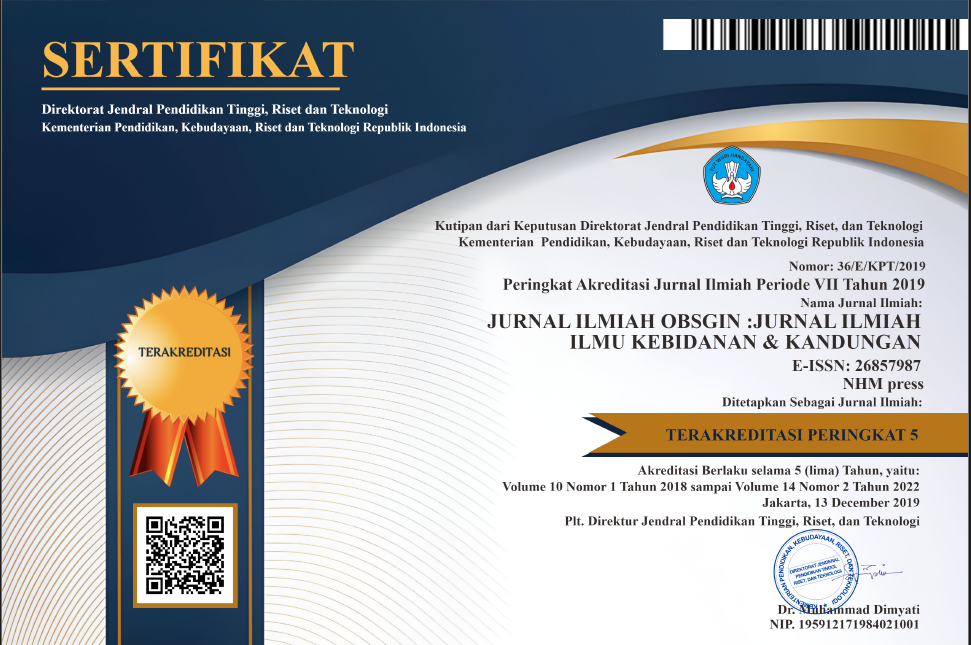HUBUNGAN TINGKAT PENGETAHUAN PENGUNJUNG TENTANG MENCUCI TANGAN DENGAN PERILAKU MENCUCI TANGAN DI RUANG INTENSIVE CARE UNIT (ICU) RSUD MERAUKE
Abstract
Background: Hospital as a place to treat sick people, hospitals are breeding grounds for germs and prone to transmission of nosocomial infections. Visitors can be contaminated with germs from the hospital environment or visitors can become carriers that spread germs to patients and the hospital environment. Hand washing is an effective enough way to prevent the spread of infection and protect patients from infection. Research Objectives: To determine the relationship between workload and stress on nurses in the ICU room at Merauke Hospital. Research Method: Knowing the relationship between the level of knowledge of visitors about hand washing and hand washing behavior in the ICU. Research method: research design using descriptive analysis with a cross sectional approach. The study population was all patient visitors in the ICU room of Merauke Hospital with a total sample of 46 visitors using accidental sampling technique. The research measurement tool used a questionnaire using univariate data analysis using frequency distribution and bivariate data analysis using the Fisher Exact test. Research results: Most respondents (73.9%) had a high level of knowledge and more than half of respondents (71.7%) indicated good hand washing behavior. Data analysis using the Fisher Exact test found that there was a relationship between the level of knowledge and visitor hand washing behavior (p=0.001; OR=0.86; α=0.05).
Conclusion: The results of this study prove that the level of knowledge has a positive relationship with visiting behavior at Merauke Hospital.
References
Kemenkes RI (2011). Pedoman Manajerial Pencegahan dan Pengendalian Infeksi di Rumah Sakit dan Fasilitas Pelayanan Kesehatan Lainnya. Jakarta: Kemenkes RI.
Dewi, Najihah, Adri (2021). Modul Praktikum Keperawatan Dasar. Indramayu Jawa Barat : Adab.
Mariana, H. E. R., Zainab, & Kholik, H. S. (2015). Hubungan Pengetahuan Tentang Infeksi Nosokomial Dengan Sikap Mencegah Infeksi Nosokomial Pada Keluarga Pasien Di Ruang Penyakit Dalam Rsud Ratu Zalecha Martapura. Jurnal Skala Kesehatan, 6(2), 1–7. Retrieved from http://www.ejurnalskalakesehatan-poltekkesbjm.com/index.php/JSK/article/view/44/87
Meryanti, M. A. S., Darmini, A. A. A. Y., & Rahayuni, I. G. A. R. (2019). Tingkat Pengetahuan Pengunjung Dalam Hand Hygiene Di Ruang Icu Rumah Sakit Bali Royal. Jurnal Riset Kesehatan Nasional, 1(2), 82–86. https://doi.org/10.37294/jrkn.v1i2.64
Mumpuningtias, E. D., Aliftitah, S., & Illiyini, I. (2019). Hubungan Tingkat Pengetahuan dengan Perilaku Cuci Tangan Menggunakan Handrub pada Keluarga Pasien di Ruang Bedah RSUD dr. H. Moh. Anwar Sumenep. Jurnal Ilmiah Keperawatan Stikes Hang Tuah Surabaya, 12(2). https://doi.org/10.30643/jiksht.v12i2.31
Notoatmodjo, S. (2014). Promosi Kesehatan dan Perilaku Kesehatan. Jakarta: Rineka Cipta.
Randan, J. R., & Sihombing, R. M. (2020). Tingkat Pengetahuan dengan Perilaku Mencuci Tangan Pengunjung di Satu Rumah Sakit Swasta Indonesia Tengah. Jurnal Ilmiah Ilmu Keperawatan Indonesia, 10(03), 118–124. https://doi.org/10.33221/jiiki.v10i03.588
Rikayanti, K. H. (2014). Hubungan Tingkat Pengetahuan Dengan Perilaku Mencuci Tangan Petugas Kesehatan Di Rumah Sakit Umum Daerah Badung Tahun 2013. Community Health, 2(1). Retrieved from http://ojs.unud.ac.id/index.php/jch/article/view/7693
Siregar & Amalia. (2013). Farmasi rumah sakit : teori dan penerapan. Jakarta : EGC.
Wawan, A., M, Dewi (2011). Teori & Pengukuran Pengetahuan, Sikap, dan Perilaku Manusia Dilengkapi Contoh Kuesioner. Nuha Medika: Yogyakarta.
World Health Organization. (2016). The Burden of Health Care-Associated Infection Worldwide A Summary. https://www.who.int/news-room/feature-stories/detail/the-burden-of-health-care-associated-infection-worldwide











